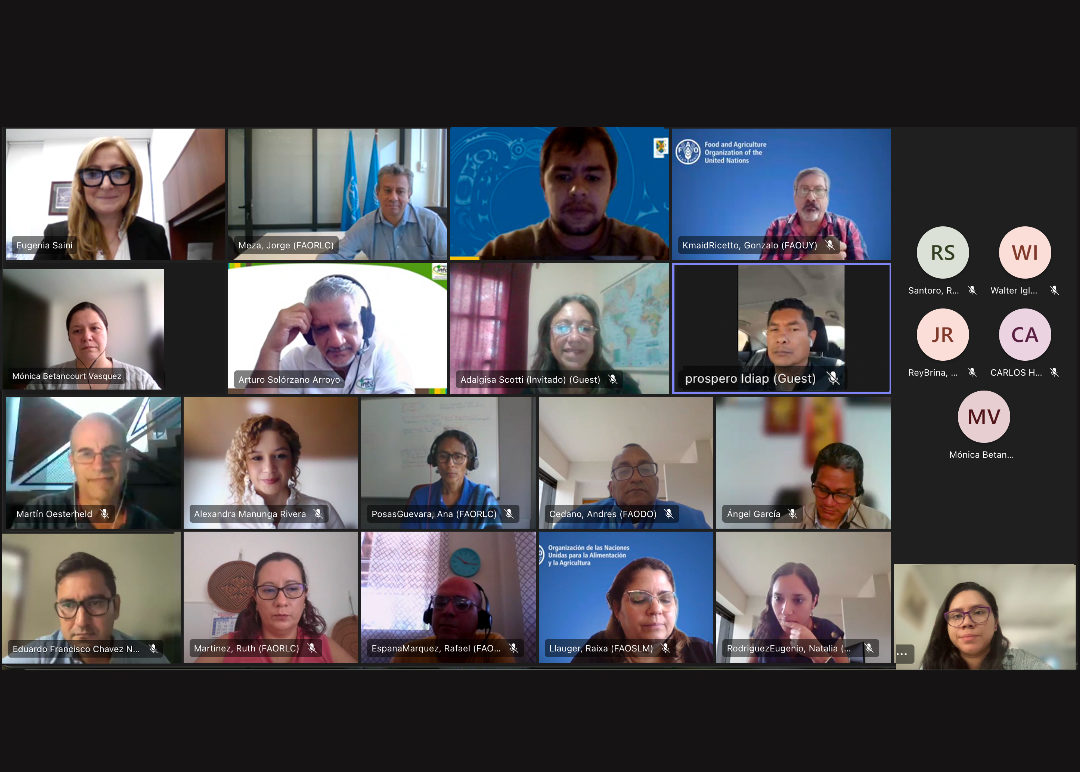March 24, 2023-. In an effort led by the Administrative Technical Secretariat of FONTAGRO in collaboration with the Regional Office of the Food and Agriculture Organization of the United Nations (FAO) for Latin America and the Caribbean, an exchange panel was held in which leaders of FONTAGRO projects presented in detail the results of new knowledge and technologies for the benefit of agriculture in the region.

This effort is in line with the interest in working in partnerships for the development of projects in the field of agriculture in Latin America, the Caribbean and Spain. Jorge Meza, FAO Senior Policy Officer for Latin America and the Caribbean, highlighted the knowledge potential that has been generated from FONTAGRO projects in different areas of enormous economic importance. “We have identified a lot of knowledge that can be shared in the initiatives that we consider to be extremely useful for the activities we carry out. We also know that this is a small portion of all the work FONTAGRO does,” he said.
The initiative was led by Dr. Eugenia Saini, Executive Secretary of FONTAGRO who mentioned the key value of strategic alliances in science, technology and innovation for the achievement of country goals and also for the Sustainable Development Goals “FONTAGRO’s mission is to lead the articulation, cooperation and regional dialogue, In 2020, for the first time in decades, FONTAGRO was able to sign a collaboration agreement with FAO, which today allows us to seek alternatives for articulation that connect science with the producer.
The projects presented during this panel were: Platform for transfer and use of bioinputs (Chile, Colombia), Satellite methane monitoring in rice growing regions of Latin America (Uruguay, Panama, Peru), Geographical indications for Mesoamerican cacao (Costa Rica, Spain, Honduras, Nicaragua, Panama), Reducing bioprocess of the solubility rhizospheric Cd (Argentina, Ecuador, Spain), Prevention and management of Fusarium wilt (Colombia, Costa Rica, Ecuador, Nicaragua, Panama, Bolivia, Paraguay, Peru, and Dominican Republic), Multi-agency cocoa platform for Latin America and the Caribbean “Cocoa 2030-2050” (Ecuador, Colombia, Costa Rica, Panama, Peru, and Dominican Republic), Scaling continuous improvement in family organic export banana (BOFX) (Dominican Republic, Ecuador, Peru).
The presentations were made by the leaders of each project and focused on results achieved or potential results, for those projects that have just started or are about to start, as well as their contribution to the achievement of the Sustainable Development Goals. Agriculture is of key importance to many of the region’s economies, accounting for between 5 and 18 percent of GDP in 20 countries in Latin America and the Caribbean, according to World Bank data. This is even higher when considering the broader contribution of all food systems.
Ana Posas Guevara, Agriculture Officer of the FAO Regional Office for Latin America and the Caribbean said the meeting “calls on us to continue coordinating future efforts and to use the resources we already have to complement the initiatives of FONTAGRO and FAO in the countries where we are working”. Dr. Posas Guevara spoke with each of the projects and stressed the importance for FAO to be in contact and support the continuity of research, development and innovation processes at the country level.
Following this meeting, future meetings are expected to be held with the objective of continuing to explore partnership opportunities that will allow both institutions to strengthen the work that both are doing in the region.
***
About FONTAGRO
FONTAGRO was created 1998 with the purpose of promoting the increase of the competitiveness of the agri-food sector, ensuring the sustainable management of natural resources and the reduction of poverty in the region. The objective of FONTAGRO is to establish itself as a sustainable financing mechanism for the development of agricultural technology and innovation in Latin America and the Caribbean and Spain, and to establish a forum for the discussion of priority topics of technological innovation. The member countries are: Argentina, Bolivia, Chile, Colombia, Costa Rica, Ecuador, Spain, Honduras, Nicaragua, Panama, Paraguay, Peru, Dominican Republic, Uruguay and Venezuela. In the last 21 years 167 regional agricultural innovation platforms have been co-financed for an amount of US $ 124 million, which has reached 452 institutions and 33 countries worldwide.
